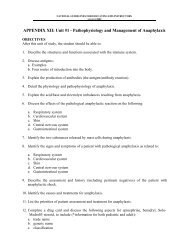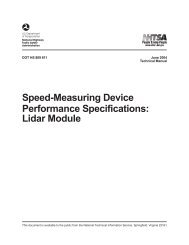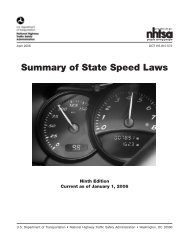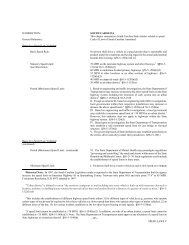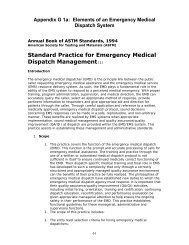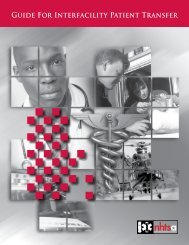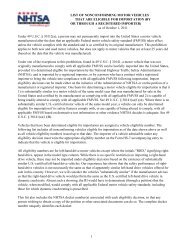The Criminal Justice System: A Guide for Law Enforcement ... - NHTSA
The Criminal Justice System: A Guide for Law Enforcement ... - NHTSA
The Criminal Justice System: A Guide for Law Enforcement ... - NHTSA
You also want an ePaper? Increase the reach of your titles
YUMPU automatically turns print PDFs into web optimized ePapers that Google loves.
during its deliberations due to lack of agreement). A mistrial generally means a retrial on<br />
the same subject.<br />
Motion in Limine A request to the court, made be<strong>for</strong>e the start of a trial, asking<br />
the judge to make a decision on a legal matter. <strong>The</strong> judge’s decision will impact how the<br />
case proceeds. Motions made by defense counsel could include Motion to Exclude<br />
Evidence (e.g., based on lack of reasonable suspicion <strong>for</strong> the stop and/or probable cause<br />
<strong>for</strong> arrest). <strong>The</strong> prosecution might request a court order <strong>for</strong> the production of the<br />
defendant’s substance abuse treatment records.<br />
Order A direction by a judge that something be done or not be done. For<br />
example, a judge may order evidence suppressed, which means the prosecution may not<br />
offer the evidence at trial. Or a judge may issue an “order of protection” commanding a<br />
defendant to have no contact with a victim.<br />
Parole Supervision by a State parole officer of an inmate after his or her release<br />
from State prison. Contrast probation, which is supervision at the local level by a county<br />
probation officer (see probation, below).<br />
Post-Conviction and Post-Judgment Motions Used to attack guilty findings. As<br />
part of these motions, the defendant may seek an evidentiary hearing to bring to light<br />
facts not litigated during the trial. For example, a defendant who is challenging the<br />
competence of his attorney may bring a post-judgment motion and request an evidentiary<br />
hearing to bring to light matters that transpired between attorney and client.<br />
Preliminary Hearing (Felony Hearing) Generally speaking, a defendant who is<br />
arrested on a felony charge and held in jail has the right to an impartial testing of the<br />
evidence within a certain time frame after arrest. One way to test the evidence is to<br />
present the case to the grand jury. In States that do not use the grand jury system, and in<br />
rural areas where grand juries sit less frequently, it is more common to test the evidence<br />
at a preliminary hearing.<br />
Defendants sometimes agree to waive their right to a preliminary hearing, <strong>for</strong> a<br />
variety of reasons, including a desire to avoid a public airing of the evidence or an<br />
agreement with the prosecution to waive the hearing in exchange <strong>for</strong> disclosure of<br />
in<strong>for</strong>mation about the prosecution’s case.<br />
For lower level felonies, it is very common <strong>for</strong> defendants to be released on their<br />
own recognizance at arraignment, or to have posted bail by the time of the preliminary<br />
hearing. This removes the reason <strong>for</strong> holding the hearing—to test the evidence<br />
justifying detention—and so no hearing is held.<br />
Pre-Trial Motions and Hearings A motion is a request by which a party<br />
(prosecution or defense) asks a judge to issue an order. For example, in criminal cases,<br />
pre-trial motions by defendants commonly include motions <strong>for</strong> dismissal of the<br />
indictment and <strong>for</strong> suppression of evidence.<br />
34



